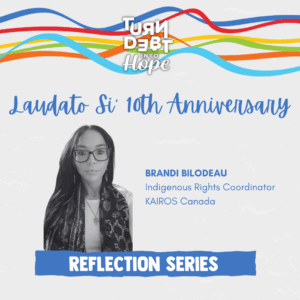Raising Hope: Laudato Si’ at 10 Years

Ecological justice is Indigenous justice
When we talk about justice for the Earth, we can’t leave Indigenous Peoples out of the conversation—because we’ve always been part of it.
For generations, our families have protected the land, the waters, the animals—not out of ownership, but out of relationship. The Earth isn’t something we manage or extract from. She’s our mother, our teacher, our relative and our responsibilities to her run deep. They are spiritual, ancestral and ongoing.
But the truth is, those relationships have been under attack for a long time. Colonization didn’t just take land—it broke relationships. It tried to erase our teachings, our languages, our ceremonies, and the very ways we live in balance with the natural world. Today, we see the legacy of that in polluted rivers, disappearing species, and the displacement of Indigenous Peoples from our homelands.
The climate crisis didn’t begin in the skies—it began with disconnection. With greed and with systems that saw land as property instead of kin.
As Indigenous Peoples, we’ve been sounding the alarm for a very long time. We’ve been defending the land, often at great risk, while also mourning the loss of what’s already been destroyed. We’ve carried the grief and the resistance. And still, we show up—with love, with strength, with teachings that hold the answers the world is now desperately seeking.
Ecological justice cannot happen without Indigenous sovereignty. It means more than just including our voices—it means respecting our authority. It means Land Back, it means honouring treaties, respecting our right to say yes or no to projects on our territories, and creating space for our knowledge systems to guide the path forward.
When we are given space to lead, we don’t just restore ecosystems—we restore relationships, because healing the land is about healing people too. When we come back into right relationship with Mother Earth and each other, that’s where true hope lives.
I do this work because I believe in that hope. I’ve seen it in the strength of our youth protecting the waters, I’ve felt it in ceremony, I’ve heard it in the stories passed down by Elders and Knowledge Keepers. Hope doesn’t come from ignoring the pain or pretending things are fine – it comes from facing the truth with open eyes and choosing to act anyway—with heart, with accountability and with vision.
We don’t need to reinvent the future, our ancestors already imagined it—and walked it. The invitation now is to listen, learn and follow in their footsteps.
Because ecological justice is Indigenous justice, and justice, in its truest form, is love in action.
By Brandi Bilodeau, Indigenous Rights Coordinator, KAIROS Canada



